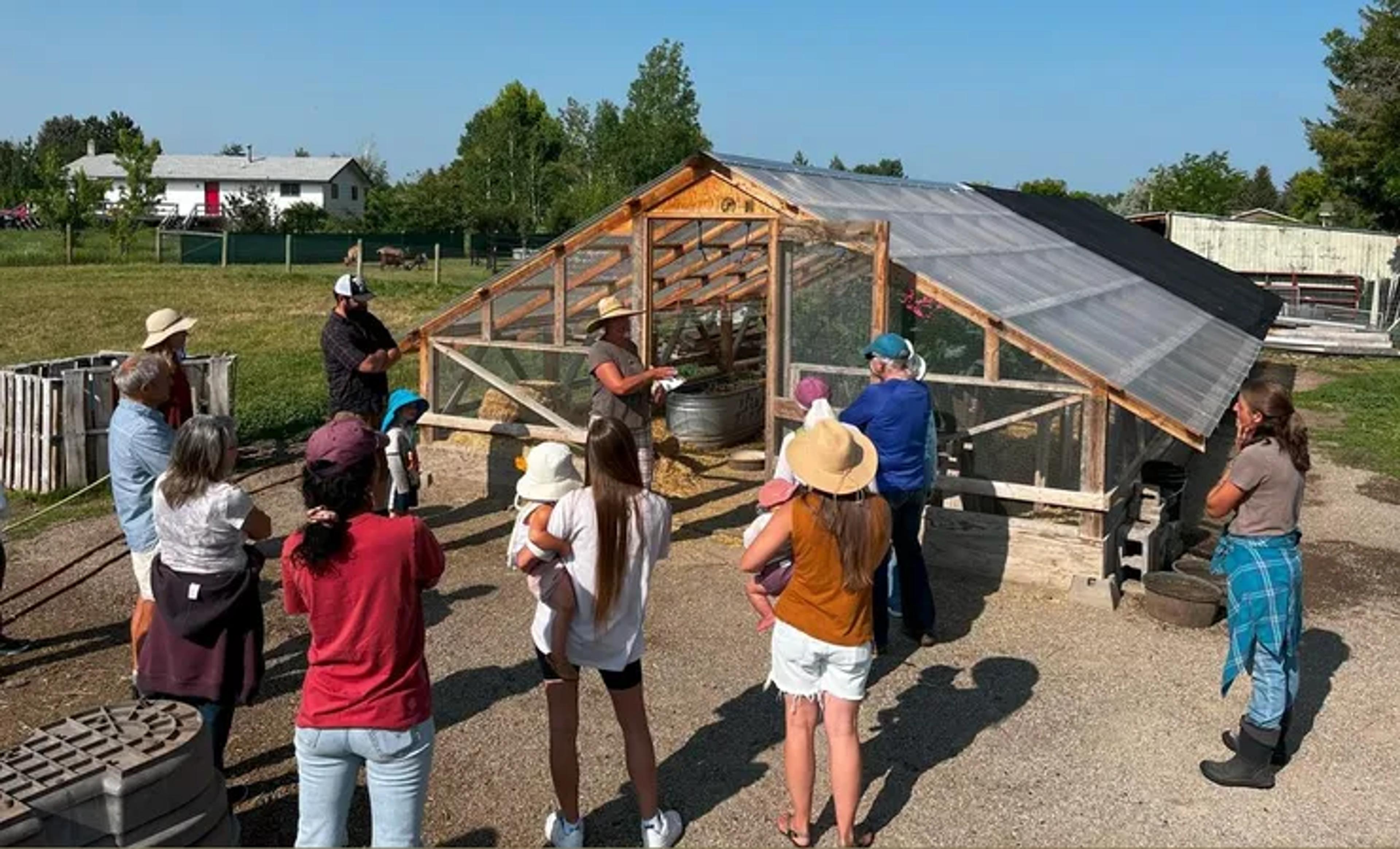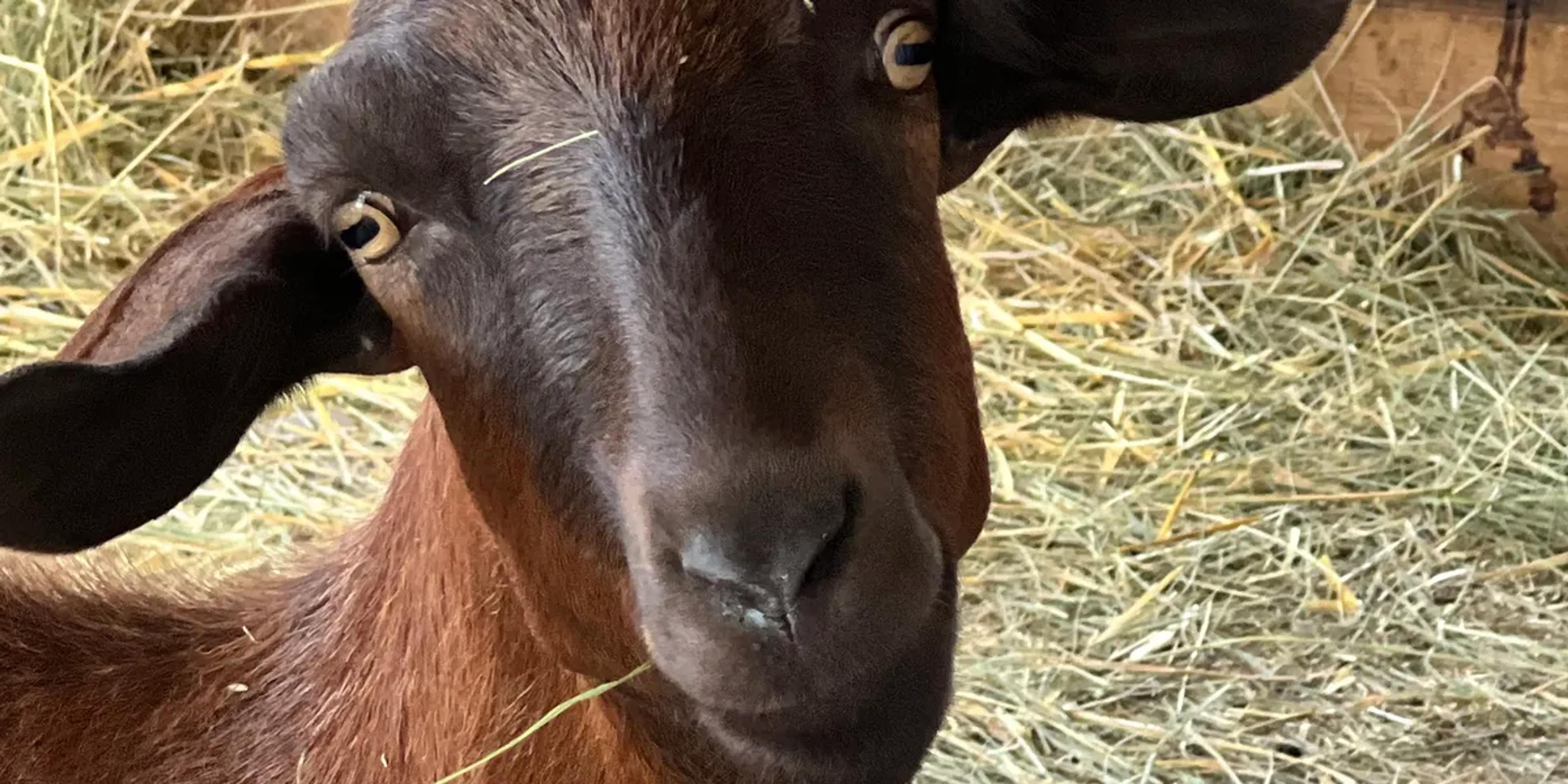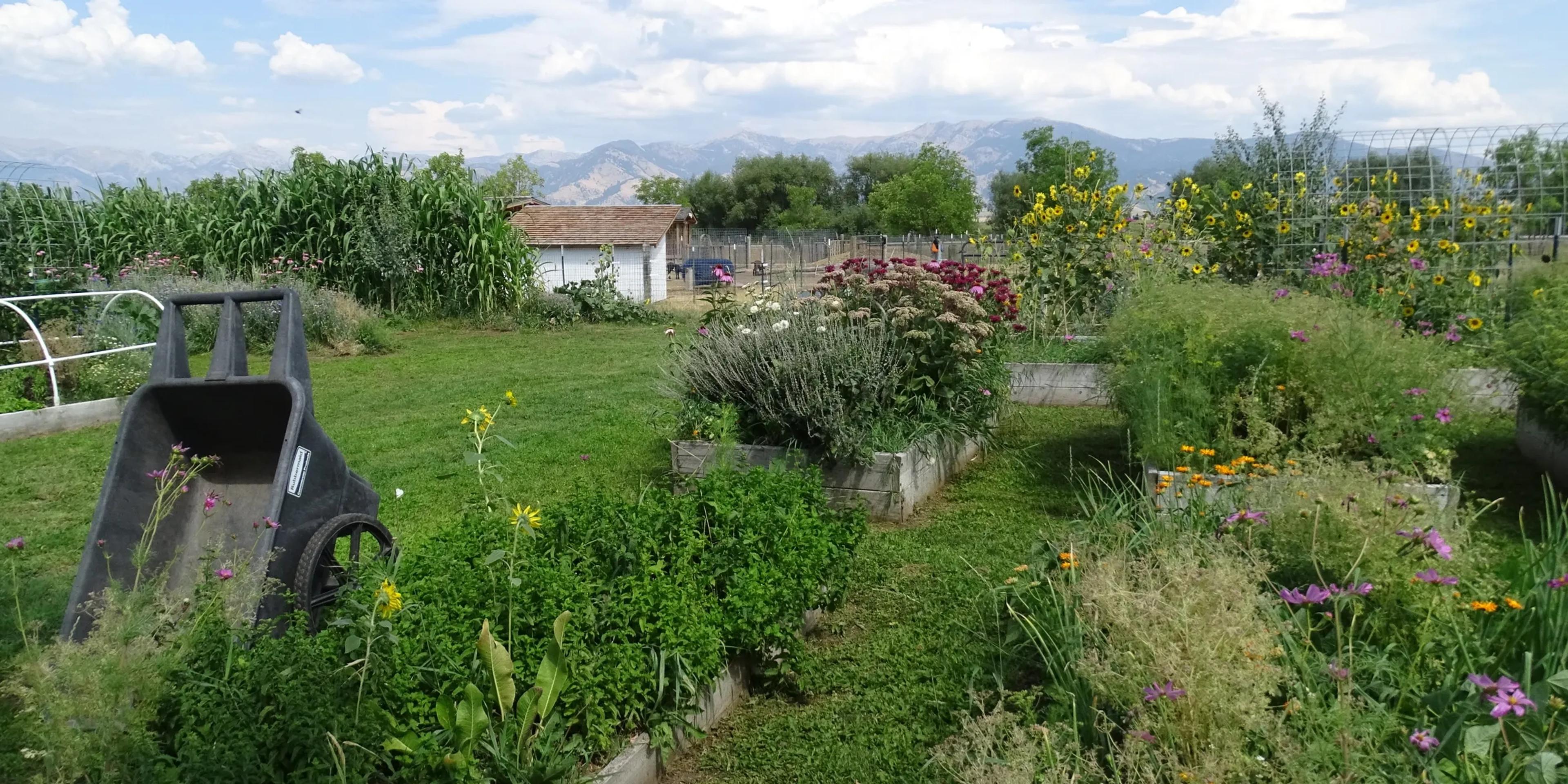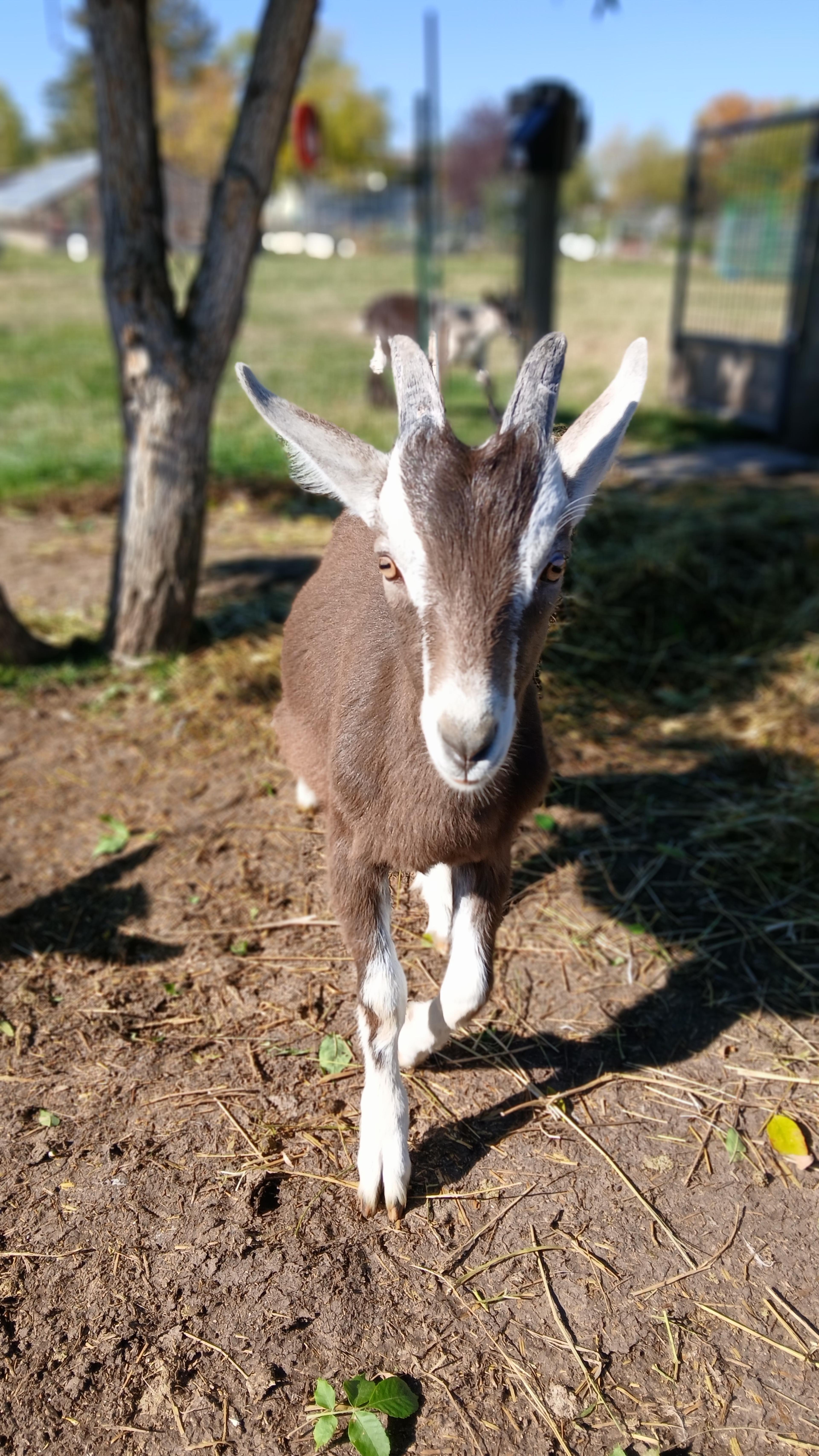"He's two seconds old," says Nancy Tanner, cradling the newborn kid in her arms. Pablo’s wrapped in a gray towel, his white-spotted head peeking out, eyes shut, forehead damp. "Right at about 1:55, our mama goat decided to kid. So they're brand new."
It’s just after 3 p.m. at Border Farm in Montana, and these are kids number 17 and 18 of the season. Nancy’s daughter, Piper, has taken the other one—Picasso—inside the barn to finish cleaning him off. "She's my new goat midwife," Nancy says. "This is her first full kidding season, and she’s done an amazing job."
The mother-daughter duo runs Border Farm at the base of the Bridger Mountains, where they raise heritage goats, ducks, and quail, and help connect their community to the type of food they like to call “place," because "all these animals, and everything from our gardens, share the same air, the same soil, and the same space as the people who are consuming them,” explains Nancy. With Montana’s eight-month winters leaving just ninety days of growing season, they fill the gap with educational classes on everything from goat milking to sourdough making.
Only recently did Piper become a part owner of the farm. "We do everything together," says her mother. "And now, we're learning how to be business partners."
"We both love animals,” Piper chimes in, coming back into the barn with baby Picasso in her arms and setting him down in the corner next to his brother. “We both love working in the gardens. We both love being outside. We both love sharing what we do with others.”
However, Piper goes on to explain, that a big part of the conversation they started having, as they began owning the business side of things together, was "how to keep doing the work we love to do and make a living."
Early in the year was when they realized that without clear systems to track where money was coming from and where their time was best spent, they wouldn't be able to grow their small farm efficiently.
The question started to get urgent: how do you turn a family farm into a real business, without losing what makes it worth doing?

Border Farm is a family-owned and operated biodynamic farm located in Bozeman, Montana.
Challenge: Too many goats, not enough clarity
Nancy’s family started biodynamic gardening in 1997; then, in the early 2000s, they added animals. At that point, they were just a small family farm—not selling anything or managing it as a business. In fact, Nancy was breeding and training dogs, on farms and ranches, full-time.
"I've been in the animal world, professionally, for a long time," she says.
It was about seven or eight years ago when the family decided to start selling their products—not just raising food for themselves, but also providing raw milk, kefir, and goat cheese to their community.
Part of the catalyst? Nancy laughs. "I’ll be honest with you, a lot of it was because every kidding season, I didn’t want to sell my kids. I love my goats. But when you get a lot of goats, you have to start doing something with them."
For 22 years, Nancy has used the same accountant for her dog training and breeding business, managing everything through QuickBooks. But, as both the dog training and farm businesses grew, they began overlapping in ways that were hard to untangle.
“We were getting different arms of the training business, the farm business, the market business, the products business, the animal business, the selling of the animals,” Nancy says, trailing off, before continuing emphatically, “It was frustrating, having to go through everything to see where our money was going. It was like untangling a knotted ball of yarn.”
"It was frustrating, having to go through everything to see where our money was going. It was like untangling a knotted ball of yarn."
Because Montana’s growing season is punishingly short, “I don't have time to sit down and have dedicated office time,” says Nancy. “I need to just get things in there, and then at the quarterly, have our accountant go over everything."
And QuickBooks? After 22 years, it still didn’t work for Nancy. "It never felt intuitive to me. I felt like I needed a degree in accounting. I couldn't do it on my own."
As for Piper, stepping into equal ownership meant needing systems that didn’t exist yet. "I knew we had to get organized," she recalls.

Nancy has been breeding and training dogs professionally since 2003.
Solution: "I told her, we need this."
Everything changed at the beginning of 2025, when Piper left for vacation and asked Nancy to temporarily take over social media for the business.
"I'm not on social media,” Nancy explains. “Piper does that for us. But let me tell you: Moms love to jump on social media and just d*ck around for a little bit. That’s how I found out about Ambrook. It popped up on some farm site.”
One of Ambrook's videos caught her attention immediately. "It was the one of taking photos of receipts right after you purchase something. I remember calling Piper as soon as I saw that. She was still on her vacation!”
But it felt urgent to Nancy. “I told her, we need this. It made so much sense to me—to be able to track things right then and there. I don't have time to sit down in the summertime when everything's happening."
"It made so much sense to me to be able to track things right then and there. I don't have time to sit down in the summertime when everything's happening."
The more Nancy learned about Ambrook, the more benefits she saw beyond convenience, such as enterprise-level tagging and tracking. "On the website, I saw how we could track the products we buy for our ducks and then the products we sell from them. We hadn’t had that ability before.”

Border Farm exists to feed, teach, and give back to the community, helping make the Bridger Valley a more beautiful place to live.
Impact: Tagging their way to clarity
Once Piper got back to the farm, she took the lead on learning the system. She had minimal accounting experience so Ambrook's educational resources helped her get set up, especially “the tutorials of certain areas like income tracking or how to do expenses."
And the support? "Every question I've had, I've called Ambrook and the team has been amazing at answering it," says Piper.
"Every question I've had, I've called Ambrook and the team has been amazing at answering it."
So far, the tagging and categorizing system has been most transformative for their diverse operation. "With Ambrook, you can actually find things easily,” says Piper, “and see exactly what product or what class or what educational thing is making the most money. We can see expenses associated with our quails and the income they’re bringing in. Then we can ask, is it worth it? That’s so important for us.”
For Nancy, the real-time visibility has changed everything, making it easier to do the books as she’s doing her business. "The efficiency of tracking it right when you do it has actually shed a light on some areas of our farm where we have a lot of sweat equity, but we're not seeing the income come back. Even in a short time of using Ambrook, understanding what actually is making money and where our time is best spent has been night and day."
What's next: Working smarter, not harder
The data that Ambrook has given them has also shifted their entire strategy for the year.
"This year we are learning through Ambrook that our educational classes are where we need to put our attention: our goat milk and our goat dairy program. Also, our gardens—we only have two crops in our gardens that actually make a significant amount of money, which is helping us expand just for those two items, not offering the stuff that just doesn't really pay for itself."
Nancy says their motto this year is “work smarter, not harder” and that philosophy extends beyond bookkeeping. "We’re streamlining across the board now. We're bringing in programs and systems where we can keep doing the work we love to do and we can also make a living.”
Nancy reflects more on what this means: "Ambrook is helping me see our farm as we grow and understand what we enjoy doing. And also understand what actually is providing an income for us."
"Ambrook is helping me see our farm as we grow and understand what we enjoy doing. And also understand what actually is providing an income for us."

Mother–daughter team behind Border Farm, Nancy Tanner and Piper Meuwissen. They're raising goats and building a sustainable business together.
Looking ahead: Standing on solid ground
Their vision for Border Farm has always been about sustainability over scale.
"We're not looking to become as big as possible," shares Nancy. "We're looking to be really sustainable, to support our local community and to make a good living. We want to be in this for the long haul.”
Teaching remains central. "There's a point where giving and teaching knowledge allows others to create the same systems. And, in my opinion, that’s how our valley becomes more beautiful."
Back in the barn, Nancy turns her camera to show the newborns. "They're walking!" she announces. The two kids are already up on their feet.
"Minutes ago he was born and now he’s standing up," Piper says.
It’s the same story for a mother-daughter operation learning to balance heritage with modern business systems: growth happens fast when you can actually see where you’re going.
Gazing down at the goats, Nancy admits, "It's always easy for me to say, I need more goats.”
"We definitely have a lot of goats," Piper adds, laughing.
“But if on the paper, it says absolutely not," acknowledges her mother, "because you're spending too much money and not making enough, that means something to me.”
Nancy heads over to the corner of the barn, and bends down to check on her two wobbly-legged kids.
“We didn't have the opportunity to track that before Ambrook,” she calls out. “Now we do.”

In the foothills of the Bridgers, Border Farm’s dairy goats keep Nancy Tanner and Piper Meuwissen busy, as they make raw milk and kefir by hand.
Try Ambrook for free

